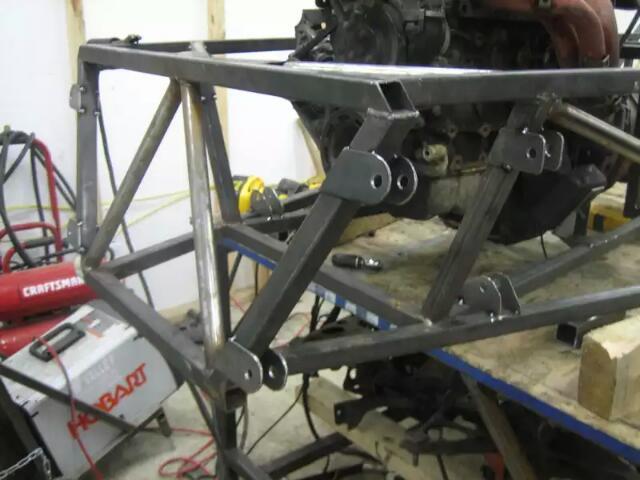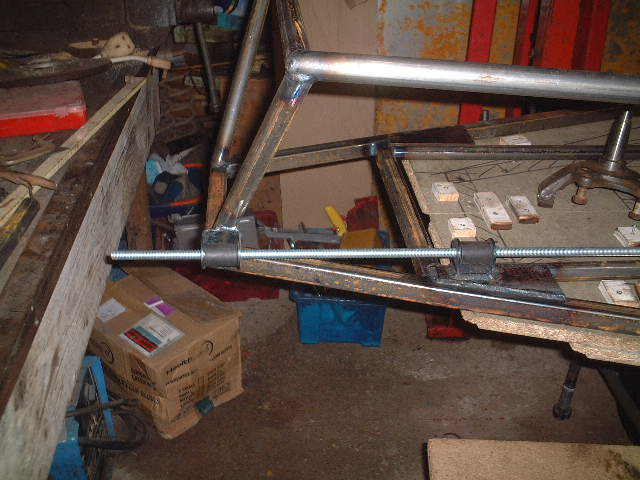greed1
|
| posted on 28/12/14 at 09:10 PM |

|
|
Any reason why I shouldn't
"Any reason why I shouldn't " Mount my front wishbones like so? Demonstrated by a USA locost
 
wishbone bracket
I will be using rosejoints so they don't need to be horizontal but would they be suitable for road and track use?
Graham
[Edited on 28/12/14 by greed1]
Drive it stright sideways
|
|
|
|
|
43655
|
| posted on 28/12/14 at 09:24 PM |

|
|
harder to get them in the right place, plus out-of-plane wishbones surely affects its characteristics?
angling the upper wishbones gives anti-squat/dive. no idea what effect moving the lowers about will have.
bit tricky to see from the photo
|
|
|
Badger_McLetcher
|
| posted on 28/12/14 at 09:42 PM |

|
|
I guess structurally if they're fully welded there wouldn't be an issue. I'd kind of be tempted to drill a couple of holes in the
plates for plug welds though, just to go belts and braces on it.
Geometrically they'll probably be a bit harder to align, but not impossible if you jig it.
|
|
|
mark chandler
|
| posted on 28/12/14 at 10:46 PM |

|
|
Not that I can see, just poke a bit of 1/2" rod through the eyes before welding.
As using rose joints from the outset I would twist the brackets by 90 degrees to save dog legging the bones.
 
lower bone suspension mount Nov 2005
[Edited on 28/12/14 by mark chandler]
|
|
|
steve m
|
| posted on 28/12/14 at 11:10 PM |

|
|
Exactly as Mark says, and if anything it could make things easier to line up
Thats was probably spelt wrong, or had some grammer, that the "grammer police have to have a moan at
  
|
|
|
MikeRJ
|
| posted on 29/12/14 at 08:57 AM |

|
|
The only real downside is that the upper wishbone brackets are usually quite a bit wider than the 25x25 RHS it's welded to in order to provide a
reasonable range of castor adjustment.
You'll also have to ensure your 'FU' upright is welded in exactly the right place to suit your wishbones, unless you are fabricating
your own wishbones to suit to the chassis.
[Edited on 29/12/14 by MikeRJ]
|
|
|
greed1
|
| posted on 29/12/14 at 09:24 AM |

|
|
Thanks for all the advice guys, glad I asked here first back to the book I go tail between legs. 
Drive it stright sideways
|
|
|
theprisioner
|
| posted on 29/12/14 at 09:25 AM |

|
|
Surely there will be sideways movement in the distance between the inner joints when the suspension moves up/down resulting in either the
chassis/wishbone fracturing? If not please explain?
http://sylvabuild.blogspot.com/
http://austin7special.blogspot.co.uk/
|
|
|
Slimy38
|
| posted on 29/12/14 at 11:03 AM |

|
|
Are you using the same thickness metal? As it looks a lot thinner than what is normally used for brackets. It almost looks like the same thickness as
the box section, which is fine for box section but awful as flat plate.
quote:
Originally posted by theprisioner
Surely there will be sideways movement in the distance between the inner joints when the suspension moves up/down resulting in either the
chassis/wishbone fracturing? If not please explain?
If you're using standard bushes then yes, you're right. To be honest I can see all sorts of issues with that option if bushes were used.
But the 360 degree (ish) movement from rosejoints should compensate for the brackets not being horizontal.
|
|
|
mark chandler
|
| posted on 29/12/14 at 11:13 AM |

|
|
Your using rose joints so no need for bracket adjustment as you toggle on the Rose joint lengths.
|
|
|
greed1
|
| posted on 29/12/14 at 11:56 AM |

|
|
Just to clarify the picture isn't my chassis but you're right it does look a bit thin! I will be using 3mm u bracket or plate depending
how far this thread goes.
As for the castor like mark described one rose joint could be wound in and the other out, therefore twisting the whole arm forward or back.
Drive it stright sideways
|
|
|









